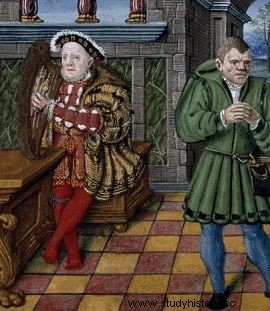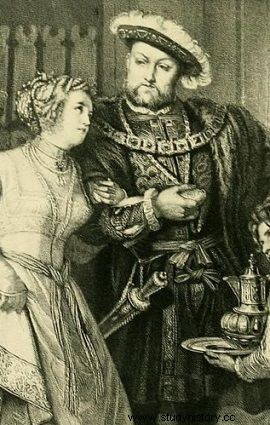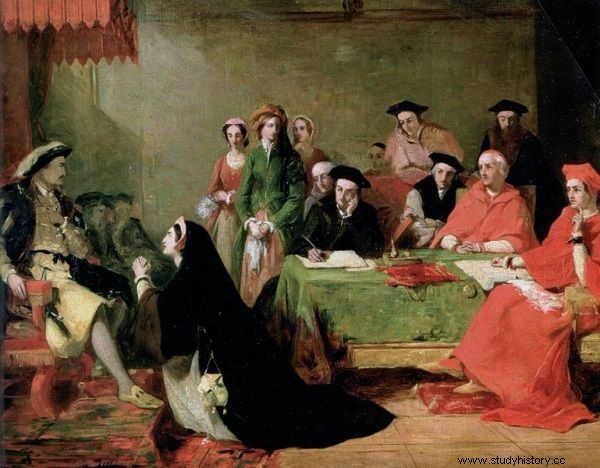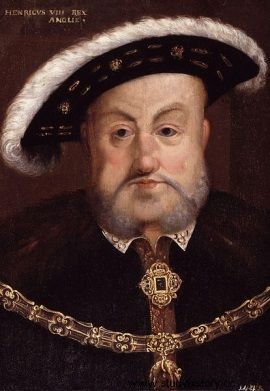We know Henry VIII mainly from the fact that he murdered his wives with passion. If it weren't for him, there wouldn't be Anglicanism either. The (un) famous king, however, had one more, forgotten face. He was the employer with his worst nightmare.
The English court in the 16th century was famous for its hellishly complicated ceremonial. Complicated regulations were part of the tradition. As if that were not enough, Henry VIII himself was truly obsessed with the order that followed him. Between marriages, divorces, and executions, he strove to keep every aspect of his life as orderly as possible.
The first step in introducing a discipline even better than before was the publication of the Eltham Ordinances in 1526. This document codified in detail the rules by which the royal court was to function.
Reduction of jobs
To begin with, the number of royal servants was reduced. The previous number of 27 was reduced to 10. As the English chronicler wrote, a great deal of lament and sadness arose when people who lost lucrative jobs had to leave the court. In the years that followed, the monarch went one step further and the number of all servants at the court decreased from 500 to 230. Real layoffs!
Additionally, each servant had an assignment of his duties written down. From then on, it was no longer possible to pretend to be a job, but in fact to spend time on carefree entertainment.

There was usually a crowd of people around the king, and they all had to walk like clockwork.
Many other things have also been specified. Meal times are strictly defined. Lunch was eaten from ten to one, and dinner from four to seven. The leftover food was given to the beggars, and not to the dogs, which, moreover, could not be outside. It was forbidden to keep greyhounds, kittens, hounds or other dogs . An exception was made only for little dogs for ladies.

Henry VIII had a head on the back of his neck. He seemed to be playing the harp calmly, and meanwhile his court was ruining another unfortunate host with his visit.
From then on, there was much less willfulness in the royal apartments. The servants had to get up at dawn to thoroughly clean the royal lavatory first thing in the morning. The door to the king's chamber must not stick, the rooms must be clean, there must be no food leftovers.
The rigor of the royal alcove
To keep the royal bedroom tidy, only the royal cousin of the Marquis of Exeter and a group of 15 servants were allowed to enter. Although the access to other chambers of the king was more freely, the rules were not completely relaxed there. It was impossible to even play recklessly cards during the King's absence.
Eltham Ordinances also regulated the king's contacts with the queen. When the ruler decided to spend the night with his lawful spouse (which in Henry's case meant the woman he considered at the moment to be his legal wife), the curtains at his bed were opened. Then he was brought his night robe and assisted in putting it on. A retinue of pages and peace-keeping accompanied him with lamps to the queen's chamber. Intimacy? At that time, she was absent neither in England nor in Poland - as we already wrote about in the article dedicated to royal wedding nights .
The documents do not specify the way in which Henryk and his lovers took place.
Save me Lord from hunger, war and ... visit of the king!
Eltham Ordinances also took care of the clothing of the royal servants. Interestingly, the chefs were forbidden to work naked. Also, the dishwashers could not be naked or poorly clothed. I wonder how common was this practice, since it required official abolition?
While some were put on, others were officially stripped of their garments (at least part of it). The servants who served at the table were not allowed to wear coats. The idea was to prevent them from carrying food and tableware under their shelves.
The thefts among the servants were a real scourge then. They could cause many problems, not only to the nobility who remained in the king's immediate vicinity. The English court, like the courts of many monarchs of that time, was often on the move. The ruler liked to enjoy the "hospitality" of his subjects during his time. The honor of taking a monarch was a prestigious distinction, but it also had a less pleasant side.
This article has more than one page. Please select another one below to continue reading.Attention! You are not on the first page of the article. If you want to read from the beginning click here.

Even rich subjects trembled at the visit of Henry VIII and his court in their estates ...
One such visit could ruin even a wealthy nobleman. Henry was not used to paying for the maintenance of his people and they also did not reach into their pouches to pay for the night.
So let us imagine the costs of just feeding a manor house of several hundred people, not to mention the costs of accommodation, games and maintenance of the king's animals and his retinue. Horrendous sums.
In addition, the host, after the departure of the noble monarch and his entourage, usually noticed a lot of shortcomings in his belongings (even door locks and furniture were lost!) .
The nobleman honored by the monarch could only hope that he would not live to see another opportunity to receive Henry at his humble threshold.
The ship continues, even without a helmsman
It is characteristic of youth that it passes quickly, regardless of whether the veins run blue or plain blood. Henry VIII also had to face old age. When he was overwhelmed by the burden of years, it happened that he did not have the strength to sign even the most necessary documents. Did the state machine stop then? None of those things!

Henry's officials did not leave him even one step, even when Catherine of Aragon fell at his feet, begging for mercy ...
The pragmatic environment of the king and the indisposition of his monarch found an answer. Instead of the ruler's signature, the so-called dry stamp was used on the documents. It was a block of wood with a cut in the shape of Henry's autograph. It was pressed against the paper so that it left a colorless embossing (indentation), which a special servant then drew with ink.

When Henry no longer had the strength to hold the pen in his hand, the resourceful servants found a way. The state machine had to continue.
Undoubtedly, the user of this stamp more than once felt like a king himself. However, there was one, small "but" ... Forging the signature of the monarch was considered a treason . Nevertheless, the official who abused Henryk's trust could count on a kind of reduced fare.
After all, beheading well-trained minions would be a terrible waste (not what easy wives exchange). That is why the users of the stamp who made forgery were pardoned from time to time. By the way, they were lucky that with Henryk, who was well known for his love of decapitation, they did not lose their heads at work.
Finally, the moment came when the entire environs of the ruler were counting down the days until Henry was visited by the Grim Reaper. Everyone knew about her inevitable approach, except for the person concerned. For predicting the king's death was a treason. In this case, no reduced fare was in force . So no one, including the medics, was eager to tell Henryk the bad news. So until the very end the king could have deluded himself that it was not his time yet.
